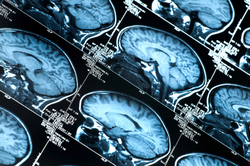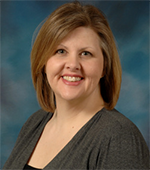
“For the medical school, 2014 was a tremendous year,” said Eric G. Neilson, MD, vice president for medical affairs and Lewis Landsberg Dean. “Feinberg faculty published groundbreaking medical discoveries, while academic programs demonstrated continued excellence. We established a number of new and innovative programs and centers, recruited more world-class faculty and admitted students of the highest caliber. At the same time, the growth of the Northwestern Medicine health system cements our status as one of the nation’s premier academic medical centers. I look forward to another year of noteworthy research discoveries and academic distinction in 2015.”
The following stories spotlight some of the notable moments from the past year:
Academic News
Founders’ Day Tradition Celebrates Start of 156th Academic Year
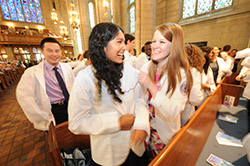 In August, the 156th Founders’ Day welcomed the incoming Class of 2018 to medical school bestowing first-year students with their white coats. Alexandra Williams picked up her crisp, white coat and listened to advice from second-year student Ryan Sacotte on August 15 as they headed to Founders’ Day, a ceremony that serves as the official start of the academic year.
In August, the 156th Founders’ Day welcomed the incoming Class of 2018 to medical school bestowing first-year students with their white coats. Alexandra Williams picked up her crisp, white coat and listened to advice from second-year student Ryan Sacotte on August 15 as they headed to Founders’ Day, a ceremony that serves as the official start of the academic year.
“It is a special honor to receive my white coat and the responsibilities that come with it,” Williams said.
Medical Scientist Training Program Celebrates 50 Years
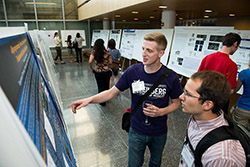 In July, the Medical Scientist Training Program celebrated its 50th anniversary with a poster session and reception attended by students, alumni and faculty. The MD/PhD program invited graduates back to the medical school from July 18-19 to celebrate the program’s 50th anniversary. This weekend also served to welcome the 14 members of the incoming class. Since 1928, more than 250 MD/PhD students have graduated from the medical school. While the first MD/PhD student attended in the 1920s, the program started in 1964 when Northwestern became one of the three original universities to receive funding by the National Institutes of Health.
In July, the Medical Scientist Training Program celebrated its 50th anniversary with a poster session and reception attended by students, alumni and faculty. The MD/PhD program invited graduates back to the medical school from July 18-19 to celebrate the program’s 50th anniversary. This weekend also served to welcome the 14 members of the incoming class. Since 1928, more than 250 MD/PhD students have graduated from the medical school. While the first MD/PhD student attended in the 1920s, the program started in 1964 when Northwestern became one of the three original universities to receive funding by the National Institutes of Health.
Research Day Continues Growth in 10th Year
In April, the 10th Annual Lewis Landsberg Research Day featured a record-setting 324 scientific posters presented by faculty, fellows, residents and students from Feinberg’s graduate, medical and physician-scientist programs. The 324 scientific posters – a 50 percent increase since 2011 – represented nearly every medical school department and showcased the work of faculty, fellows, residents and students from Feinberg’s graduate, medical and physician-scientist programs. “Better science is at the heart of what we do here on campus to make all of us better physicians,” said Eric G. Neilson, MD, vice president for Medical Affairs and Lewis Landsberg Dean.
Students Celebrate Match Day 2014
All 163 students in the graduating class of 2014 tore open their envelopes on March 24 to discover which residency program they will train at for the next three to seven years. Match Day is held at medical schools throughout the country at the same time every year. More than 90 percent of U.S. medical school seniors matched to residency positions, and for the second year in a row, the total number of match registrants topped 40,000, according to the National Residents Matching Program (NRMP). matches are made by using a computerized mathematical algorithm to align the preferences of applicants with the preferences of residency program directors to fill the training positions available in U.S. teaching hospitals.
Class of 2014 Celebrates Commencement
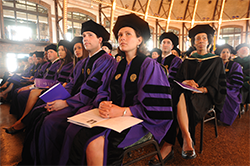 Faculty, relatives and friends gathered in May at Chicago’s Navy Pier to celebrate the Class of 2014’s graduation. The commencement speaker was Robert J. Alpern, MD, dean of Yale School of Medicine and Ensign Professor of Medicine. An alumnus of Northwestern University, Dr. Alpern’s research career has focused on the regulation of kidney transport proteins, and his early investigations helped define the mechanisms by which the kidney transports acid.
Faculty, relatives and friends gathered in May at Chicago’s Navy Pier to celebrate the Class of 2014’s graduation. The commencement speaker was Robert J. Alpern, MD, dean of Yale School of Medicine and Ensign Professor of Medicine. An alumnus of Northwestern University, Dr. Alpern’s research career has focused on the regulation of kidney transport proteins, and his early investigations helped define the mechanisms by which the kidney transports acid.
“As you leave these academic halls today to enter the next chapter of your journey, I urge you to strive to be a physician with compassion, humility, knowledge and prudence,” Alpern said.
Making Connections at the Fourth Annual Les Turner ALS Symposium
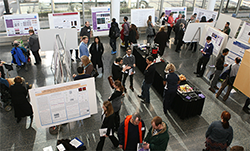 National and local ALS researchers, experts, doctors and patients gathered at the Fourth Annual Les Turner Symposium on ALS and NeuroRepair on Dec. 11. The event – the fourth annual ALS symposium – featured data blitz sessions by many local ALS experts, a poster session and an “Ask the ALS Experts” panel for patients. Hande Ozdinler, PhD, associate professor in the Ken and Ruth Davee Department of Neurology and organizer of the event, welcomed guests and explained the theme of this year’s symposium: “Neurons that fire together, wire together,” which she said emphasizes not only the need for neurons to fire together in our bodies but also the need for experts in the field to collaborate on research and sharing of data.
National and local ALS researchers, experts, doctors and patients gathered at the Fourth Annual Les Turner Symposium on ALS and NeuroRepair on Dec. 11. The event – the fourth annual ALS symposium – featured data blitz sessions by many local ALS experts, a poster session and an “Ask the ALS Experts” panel for patients. Hande Ozdinler, PhD, associate professor in the Ken and Ruth Davee Department of Neurology and organizer of the event, welcomed guests and explained the theme of this year’s symposium: “Neurons that fire together, wire together,” which she said emphasizes not only the need for neurons to fire together in our bodies but also the need for experts in the field to collaborate on research and sharing of data.
Research Breakthroughs
New Glaucoma Cause Discovered
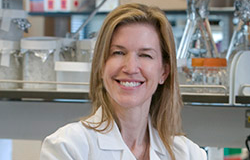 Northwestern Medicine scientists discovered a novel cause of glaucoma in an animal model, and related to their findings, are now developing an eye drop aimed at curing the disease. In glaucoma, pressure builds from poor drainage of fluid from the anterior chamber of the eye, destroying retinal ganglion cells and eventually the optic nerve. The new study, published in September, for the first time identifies the molecular building blocks needed to make the ‘drainage’ vessels, providing the necessary chemical tools to repair the eye’s plumbing and restore normal drainage. “This is a big step forward in understanding the cause of the disease that steals the eyesight from 60 million people worldwide,” said senior study author Susan Quaggin, MD, director of the Feinberg Cardiovascular Research Institute at Northwestern University Feinberg School of Medicine and chief of Medicine-Nephrology and Hypertension.
Northwestern Medicine scientists discovered a novel cause of glaucoma in an animal model, and related to their findings, are now developing an eye drop aimed at curing the disease. In glaucoma, pressure builds from poor drainage of fluid from the anterior chamber of the eye, destroying retinal ganglion cells and eventually the optic nerve. The new study, published in September, for the first time identifies the molecular building blocks needed to make the ‘drainage’ vessels, providing the necessary chemical tools to repair the eye’s plumbing and restore normal drainage. “This is a big step forward in understanding the cause of the disease that steals the eyesight from 60 million people worldwide,” said senior study author Susan Quaggin, MD, director of the Feinberg Cardiovascular Research Institute at Northwestern University Feinberg School of Medicine and chief of Medicine-Nephrology and Hypertension.
Brain Abnormalities Linked to Casual Marijuana Use
Young adults who used marijuana only recreationally showed significant abnormalities in two key brain regions that are important in emotion and motivation, Northwestern Medicine scientists reported in April. The study was a collaboration between Northwestern Medicine and Massachusetts General Hospital/Harvard Medical School. This is the first study to show casual use of marijuana is related to major brain changes. It showed the degree of brain abnormalities in these regions is directly related to the number of joints a person smoked per week. The more joints a person smoked, the more abnormal the shape, volume and density of the brain regions. “This study raises a strong challenge to the idea that casual marijuana use isn’t associated with bad consequences,” said corresponding and co-senior study author Hans Breiter, MD, a professor in Psychiatry and Behavioral Sciences.
Electric Current to Brain May Help Treat Memory Disorders
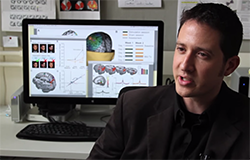 Stimulating a particular region in the brain via non-invasive delivery of electrical current using magnetic pulses, called Transcranial Magnetic Stimulation, improves memory, according to a Northwestern Medicine study published in August. The discovery opens a new field of possibilities for treating memory impairments caused by conditions such as stroke, early-stage Alzheimer’s disease, traumatic brain injury, cardiac arrest and the memory problems that occur in healthy aging. “We show for the first time that you can specifically change memory functions of the brain in adults without surgery or drugs, which have not proven effective,” said senior author Joel Voss, PhD, assistant professor of Medical Social Sciences at Northwestern University Feinberg School of Medicine.
Stimulating a particular region in the brain via non-invasive delivery of electrical current using magnetic pulses, called Transcranial Magnetic Stimulation, improves memory, according to a Northwestern Medicine study published in August. The discovery opens a new field of possibilities for treating memory impairments caused by conditions such as stroke, early-stage Alzheimer’s disease, traumatic brain injury, cardiac arrest and the memory problems that occur in healthy aging. “We show for the first time that you can specifically change memory functions of the brain in adults without surgery or drugs, which have not proven effective,” said senior author Joel Voss, PhD, assistant professor of Medical Social Sciences at Northwestern University Feinberg School of Medicine.
Heart Attack Damage Slashed with Microparticle Therapy
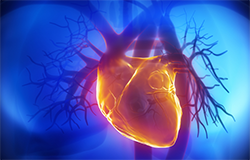 After a heart attack, much of the damage to the heart muscle is caused by inflammatory cells that rush to the scene of the oxygen-starved tissue. But that inflammatory damage is slashed in half when microparticles are injected into the blood stream within 24 hours of the attack, according to preclinical research from Northwestern Medicine and the University of Sydney in Australia, published in January. When biodegradable microparticles were injected after a heart attack, the size of the heart lesion was reduced by 50 percent and the heart could pump significantly more blood. “This is the first therapy that specifically targets a key driver of the damage that occurs after a heart attack,” said investigator Daniel Getts, a visiting scholar in Microbiology-Immunology at Northwestern University Feinberg School of Medicine.
After a heart attack, much of the damage to the heart muscle is caused by inflammatory cells that rush to the scene of the oxygen-starved tissue. But that inflammatory damage is slashed in half when microparticles are injected into the blood stream within 24 hours of the attack, according to preclinical research from Northwestern Medicine and the University of Sydney in Australia, published in January. When biodegradable microparticles were injected after a heart attack, the size of the heart lesion was reduced by 50 percent and the heart could pump significantly more blood. “This is the first therapy that specifically targets a key driver of the damage that occurs after a heart attack,” said investigator Daniel Getts, a visiting scholar in Microbiology-Immunology at Northwestern University Feinberg School of Medicine.
Drug Halts Protein Known to Affect Aging
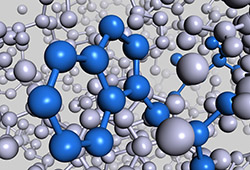 In May, Northwestern Medicine scientists published a study that identified a protein’s key role in cell and physiological aging and have developed – in collaboration with Tohoku University in Japan – an experimental drug that inhibits the protein’s effect and prolonged the lifespan in a mouse model of accelerated aging. The rapidly aging mice fed the experimental drug lived more than four times longer than a control group, and their lungs and vascular system were protected from accelerated aging, the new study reports. The experimental drug could potentially be used to treat human diseases that cause accelerated aging, such as chronic kidney disease, diabetes and HIV infection as well as the effects of cigarette smoking. “A drug like this could help reduce complications in clinical conditions that reflect accelerated aging,” said Douglas Vaughan, MD, senior author of the study, chair of Medicine and the Irving S. Cutter Professor of Medicine.
In May, Northwestern Medicine scientists published a study that identified a protein’s key role in cell and physiological aging and have developed – in collaboration with Tohoku University in Japan – an experimental drug that inhibits the protein’s effect and prolonged the lifespan in a mouse model of accelerated aging. The rapidly aging mice fed the experimental drug lived more than four times longer than a control group, and their lungs and vascular system were protected from accelerated aging, the new study reports. The experimental drug could potentially be used to treat human diseases that cause accelerated aging, such as chronic kidney disease, diabetes and HIV infection as well as the effects of cigarette smoking. “A drug like this could help reduce complications in clinical conditions that reflect accelerated aging,” said Douglas Vaughan, MD, senior author of the study, chair of Medicine and the Irving S. Cutter Professor of Medicine.
Heart Disease Warning at Age 18
 Elevated blood pressure as young as age 18 is a warning sign of cardiovascular disease developing later in life and the time to begin prevention, according to a large national Northwestern Medicine study published in February. That’s decades earlier than clinicians and patients generally start thinking about heart disease risk. The study also found distinct blood pressure patterns from ages 18 to 55 that reveal people at high risk for calcification of coronary arteries – a marker for heart disease – by middle age. Also known as hardening of the arteries, these calcium deposits can narrow coronary arteries and increase heart attack risk. The 25-year study is the first to identify different long-term patterns of blood pressure levels and resulting cardiovascular risk. “This shows that your blood pressure in young adulthood can impact your risk for heart disease later in life,” said Norrina Allen, PhD, lead study author and assistant professor of Preventive Medicine.
Elevated blood pressure as young as age 18 is a warning sign of cardiovascular disease developing later in life and the time to begin prevention, according to a large national Northwestern Medicine study published in February. That’s decades earlier than clinicians and patients generally start thinking about heart disease risk. The study also found distinct blood pressure patterns from ages 18 to 55 that reveal people at high risk for calcification of coronary arteries – a marker for heart disease – by middle age. Also known as hardening of the arteries, these calcium deposits can narrow coronary arteries and increase heart attack risk. The 25-year study is the first to identify different long-term patterns of blood pressure levels and resulting cardiovascular risk. “This shows that your blood pressure in young adulthood can impact your risk for heart disease later in life,” said Norrina Allen, PhD, lead study author and assistant professor of Preventive Medicine.
Tissue Regeneration Using Anti-inflammatory Nanomolecules
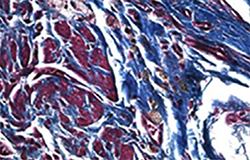 The research group of Arun Sharma, PhD, research assistant professor in Urology, works on innovative approaches to tissue regeneration to improve the lives of patients with urinary bladder dysfunction. As published in August, the team developed a system that may protect against the inflammatory reaction that can negatively impact tissue growth, development and function. Self-assembling peptide amphiphiles (Pas) are biocompatible and biodegradable nanomaterials that have demonstrated utility in a wide range of settings and applications. “Our findings are very relevant not just for bladder regeneration but for other types of tissue regeneration where foreign materials are utilized for structural support. I also envision the potential utility of these nanomolecules for the treatment of a wide range of dysfunctional inflammatory based conditions,” Sharma said.
The research group of Arun Sharma, PhD, research assistant professor in Urology, works on innovative approaches to tissue regeneration to improve the lives of patients with urinary bladder dysfunction. As published in August, the team developed a system that may protect against the inflammatory reaction that can negatively impact tissue growth, development and function. Self-assembling peptide amphiphiles (Pas) are biocompatible and biodegradable nanomaterials that have demonstrated utility in a wide range of settings and applications. “Our findings are very relevant not just for bladder regeneration but for other types of tissue regeneration where foreign materials are utilized for structural support. I also envision the potential utility of these nanomolecules for the treatment of a wide range of dysfunctional inflammatory based conditions,” Sharma said.
Potential Therapy Found for Incurable Pediatric Brain Tumor
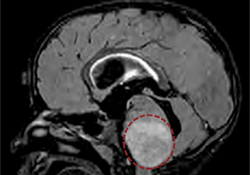 In November, Northwestern Medicine scientists announced that they discovered a new potential drug therapy for a rare, incurable pediatric brain tumor by targeting a genetic mutation found in children with the cancer. By inhibiting the tumor-forming consequences of the mutation using an experimental drug called GSKJ4, they delayed tumor growth and prolonged survival in mice with pediatric brainstem glioma. Also known as diffuse intrinsic pontine glioma (DIPG), the disease occurs when tumors form in the brainstem, which controls essential body functions such as breathing, heartbeat and motor and sensory pathways. “No significant advances in the survival of DIPG patients have been made over the last few decades, and new therapeutic approaches are desperately needed,” said first author of the study Rintaro Hashizume, MD, PhD, assistant professor in Neurological Surgery.
In November, Northwestern Medicine scientists announced that they discovered a new potential drug therapy for a rare, incurable pediatric brain tumor by targeting a genetic mutation found in children with the cancer. By inhibiting the tumor-forming consequences of the mutation using an experimental drug called GSKJ4, they delayed tumor growth and prolonged survival in mice with pediatric brainstem glioma. Also known as diffuse intrinsic pontine glioma (DIPG), the disease occurs when tumors form in the brainstem, which controls essential body functions such as breathing, heartbeat and motor and sensory pathways. “No significant advances in the survival of DIPG patients have been made over the last few decades, and new therapeutic approaches are desperately needed,” said first author of the study Rintaro Hashizume, MD, PhD, assistant professor in Neurological Surgery.
Longer Surgery Means Higher Blood Clot Risk
 The longer the duration of surgery, the higher the risk of a life-threatening blood clot, according to the first large-scale, quantitative national study of the risk across all surgical procedures, published in December. The Northwestern Medicine study was published in JAMA Surgery; the findings will help guide surgical decision-making by enabling surgeons and patients to better understand the potential risk of procedures. These findings may also spur surgeons to take more aggressive preventative measures such as giving a patient blood thinner to reduce the risk of clots and limiting longer surgeries by splitting up procedures. “Minute by minute, hour by hour, the trend is much more pervasive and consistent than any of us believed it could be,” said senior study author John Kim, MD, associate professor in Surgery-Plastic and Dermatology. “It was true across all procedures, specialties and hospitals.”
The longer the duration of surgery, the higher the risk of a life-threatening blood clot, according to the first large-scale, quantitative national study of the risk across all surgical procedures, published in December. The Northwestern Medicine study was published in JAMA Surgery; the findings will help guide surgical decision-making by enabling surgeons and patients to better understand the potential risk of procedures. These findings may also spur surgeons to take more aggressive preventative measures such as giving a patient blood thinner to reduce the risk of clots and limiting longer surgeries by splitting up procedures. “Minute by minute, hour by hour, the trend is much more pervasive and consistent than any of us believed it could be,” said senior study author John Kim, MD, associate professor in Surgery-Plastic and Dermatology. “It was true across all procedures, specialties and hospitals.”
First Mouse Model For ALS Dementia
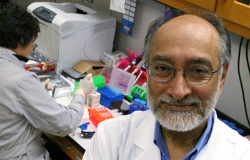 In September, Northwestern Medicine scientists announced that they had developed the first animal model for ALS dementia, a form of ALS that also damages the brain. The advance will allow researchers to directly see the brains of living mice, under anesthesia, at the microscopic level. This will allow direct monitoring of test drugs to determine if they work. This is one of the latest research findings since the ALS Ice Bucket Challenge heightened interest in the disease and the need for expanded research and funding. “This new model will allow rapid testing and direct monitoring of drugs in real time,” said study senior author Teepu Siddique, MD, Les Turner ALS Foundation/Herbert C. Wenske Foundation Professor in the Ken and Ruth Davee Department of Neurology and Cell and Molecular Biology . “This will allow scientists to move quickly and accelerate the testing of drug therapies.”
In September, Northwestern Medicine scientists announced that they had developed the first animal model for ALS dementia, a form of ALS that also damages the brain. The advance will allow researchers to directly see the brains of living mice, under anesthesia, at the microscopic level. This will allow direct monitoring of test drugs to determine if they work. This is one of the latest research findings since the ALS Ice Bucket Challenge heightened interest in the disease and the need for expanded research and funding. “This new model will allow rapid testing and direct monitoring of drugs in real time,” said study senior author Teepu Siddique, MD, Les Turner ALS Foundation/Herbert C. Wenske Foundation Professor in the Ken and Ruth Davee Department of Neurology and Cell and Molecular Biology . “This will allow scientists to move quickly and accelerate the testing of drug therapies.”
Device That Protects Against HIV, Pregnancy Enters Clinical Trial
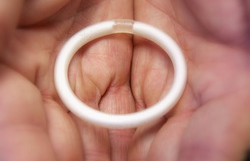 Women’s reproductive health may never be the same, thanks to Northwestern University biomedical engineer Patrick Kiser, PhD, and his first-of-its-kind intravaginal ring that reliably delivers an antiretroviral drug and a contraceptive for months. Kiser’s one ring delivers two drugs that do three important things: the device is designed to protect against HIV and herpes as well as unwanted pregnancy. It will be the first device with the potential to offer this protection to be tested in women. The easy-to-use ring delivers controlled doses of tenofovir (a common antiretroviral drug) and levonorgestrel (a contraceptive) for 90 days. The rings are being manufactured now, and the device soon will undergo its first test in women.
Women’s reproductive health may never be the same, thanks to Northwestern University biomedical engineer Patrick Kiser, PhD, and his first-of-its-kind intravaginal ring that reliably delivers an antiretroviral drug and a contraceptive for months. Kiser’s one ring delivers two drugs that do three important things: the device is designed to protect against HIV and herpes as well as unwanted pregnancy. It will be the first device with the potential to offer this protection to be tested in women. The easy-to-use ring delivers controlled doses of tenofovir (a common antiretroviral drug) and levonorgestrel (a contraceptive) for 90 days. The rings are being manufactured now, and the device soon will undergo its first test in women.
How Memory Rewrites the Past
 Your memory is a wily time traveler, plucking fragments of the present and inserting them into the past, reported a Northwestern Medicine study in February. In terms of accuracy, it’s no video camera. Rather, the memory rewrites the past with current information, updating your recollections with new experiences. Love at first sight, for example, is more likely a trick of your memory than a Hollywood-worthy moment. “When you think back to when you met your current partner, you may recall this feeling of love and euphoria,” said lead author Donna Jo Bridge, a postdoctoral fellow in Medical Social Sciences at Northwestern University Feinberg School of Medicine. “But you may be projecting your current feelings back to the original encounter with this person.” The study is the the first to show specifically how memory is faulty, and how it can insert things from the present into memories of the past when those memories are retrieved.
Your memory is a wily time traveler, plucking fragments of the present and inserting them into the past, reported a Northwestern Medicine study in February. In terms of accuracy, it’s no video camera. Rather, the memory rewrites the past with current information, updating your recollections with new experiences. Love at first sight, for example, is more likely a trick of your memory than a Hollywood-worthy moment. “When you think back to when you met your current partner, you may recall this feeling of love and euphoria,” said lead author Donna Jo Bridge, a postdoctoral fellow in Medical Social Sciences at Northwestern University Feinberg School of Medicine. “But you may be projecting your current feelings back to the original encounter with this person.” The study is the the first to show specifically how memory is faulty, and how it can insert things from the present into memories of the past when those memories are retrieved.
Vitamin D Deficiency Linked to Aggressive Prostate Cancer
 African-American and European-American men at high risk of prostate cancer have greater odds of being diagnosed with an aggressive form of the disease if they have a vitamin D deficiency, according to a study from Northwestern Medicine and the University of Illinois at Chicago (UIC). The vitamin D deficiency seemed to be a predictor of aggressive forms of prostate cancer diagnosis in African-American and European-American men, even after adjusting for potential confounders, including diet, smoking habits, obesity, family history and calcium intake. “Vitamin D deficiency could be a biomarker of advanced prostate tumor progression in large segments of the general population,” said Adam B. Murphy, MD, lead author of the study and assistant professor in Urology.
African-American and European-American men at high risk of prostate cancer have greater odds of being diagnosed with an aggressive form of the disease if they have a vitamin D deficiency, according to a study from Northwestern Medicine and the University of Illinois at Chicago (UIC). The vitamin D deficiency seemed to be a predictor of aggressive forms of prostate cancer diagnosis in African-American and European-American men, even after adjusting for potential confounders, including diet, smoking habits, obesity, family history and calcium intake. “Vitamin D deficiency could be a biomarker of advanced prostate tumor progression in large segments of the general population,” said Adam B. Murphy, MD, lead author of the study and assistant professor in Urology.
Protein May Provide Early Biomarker for Prostate Cancer
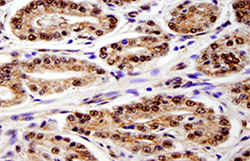 Elevated levels of a protein associated with cell cycle regulation may allow physicians to identify prostate cancer at its earliest stages, according to research published in May. Debabrata Chakravarti, PhD, professor of Obstetrics and Gynecology-Reproductive Biology Research, led the study, which revealed the surprising role for WDR5. “Our results showed that the overexpression of this protein may be necessary for the initiation, maintenance and growth of prostate cancer,” said Chakravarti. “If WDR5 is in fact a driver protein, we may also be able to develop a compound that would block a critical interaction and stymie the disease.”
Elevated levels of a protein associated with cell cycle regulation may allow physicians to identify prostate cancer at its earliest stages, according to research published in May. Debabrata Chakravarti, PhD, professor of Obstetrics and Gynecology-Reproductive Biology Research, led the study, which revealed the surprising role for WDR5. “Our results showed that the overexpression of this protein may be necessary for the initiation, maintenance and growth of prostate cancer,” said Chakravarti. “If WDR5 is in fact a driver protein, we may also be able to develop a compound that would block a critical interaction and stymie the disease.”
New Target for Huntington’s Disease Therapy
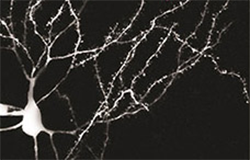 In August, Northwestern Medicine scientists announced that they had discovered a new origin for the abnormal involuntary movements associated with Huntington’s disease. Huntington’s disease is a neurodegenerative genetic disorder whose earliest pathology appears in the striatum, a region of the forebrain involved in the control of movement. “The degeneration in Huntington’s disease was thought to be a consequence of impaired delivery of a survival signal to the striatum, causing it to wither and die,” said D. James Surmeier, PhD, chair of the Department of Physiology and senior investigator of the study. “We show that at least in the early stages of the disease, this isn’t the case. Rather, the problem stems from a misinterpretation of the survival signal.”
In August, Northwestern Medicine scientists announced that they had discovered a new origin for the abnormal involuntary movements associated with Huntington’s disease. Huntington’s disease is a neurodegenerative genetic disorder whose earliest pathology appears in the striatum, a region of the forebrain involved in the control of movement. “The degeneration in Huntington’s disease was thought to be a consequence of impaired delivery of a survival signal to the striatum, causing it to wither and die,” said D. James Surmeier, PhD, chair of the Department of Physiology and senior investigator of the study. “We show that at least in the early stages of the disease, this isn’t the case. Rather, the problem stems from a misinterpretation of the survival signal.”
New Path to Stop the Spread of Breast Cancer Cells Discovered
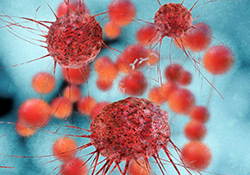 The primary cause of death from breast cancer is the spread of tumor cells from the breast to other organs in the body. In June, Northwestern Medicine scientists announced that they discovered a new pathway that can stop breast cancer cells from spreading. Working with human breast cancer cells and mouse models of breast cancer, scientists identified a new protein that plays a key role in reprogramming cancer cells to migrate and invade other organs. When that protein is removed from cancer cells in mice, the ability of the cells to metastasize to the lung is dramatically decreased. The protein, hnRNPM, helps launch a cascade of events that enables breast cancer cells to break away from the original tumor, penetrate the blood stream, invade another part of the body and form a new nodule of that tumor. “Our research suggests that hnRNPM could be an effective target to stop cancer cells from spreading,” said Northwestern Medicine scientist Chonghui Cheng, MD, PhD, Assistant Professor in Medicine-Hematology/Oncology.
The primary cause of death from breast cancer is the spread of tumor cells from the breast to other organs in the body. In June, Northwestern Medicine scientists announced that they discovered a new pathway that can stop breast cancer cells from spreading. Working with human breast cancer cells and mouse models of breast cancer, scientists identified a new protein that plays a key role in reprogramming cancer cells to migrate and invade other organs. When that protein is removed from cancer cells in mice, the ability of the cells to metastasize to the lung is dramatically decreased. The protein, hnRNPM, helps launch a cascade of events that enables breast cancer cells to break away from the original tumor, penetrate the blood stream, invade another part of the body and form a new nodule of that tumor. “Our research suggests that hnRNPM could be an effective target to stop cancer cells from spreading,” said Northwestern Medicine scientist Chonghui Cheng, MD, PhD, Assistant Professor in Medicine-Hematology/Oncology.
Stunning Zinc Fireworks When Egg Meets Sperm
 Sparks literally fly when a sperm and an egg hit it off. The fertilized mammalian egg releases from its surface billions of zinc atoms in “zinc sparks,” one wave after another, a Northwestern University-led interdisciplinary research team has found. Using cutting-edge technology they developed, the team is the first to capture images of these molecular fireworks and pinpoint the origin of the zinc sparks: tiny zinc-rich packages just below the egg’s surface. The amount of zinc released by an egg could be a great marker for identifying a high-quality fertilized egg, something we can’t do now,” said Teresa K. Woodruff, Teresa Woodruff, PhD, Thomas J. Watkins Memorial Professor of Obstetrics and Gynecology and one of two corresponding authors of the study.
Sparks literally fly when a sperm and an egg hit it off. The fertilized mammalian egg releases from its surface billions of zinc atoms in “zinc sparks,” one wave after another, a Northwestern University-led interdisciplinary research team has found. Using cutting-edge technology they developed, the team is the first to capture images of these molecular fireworks and pinpoint the origin of the zinc sparks: tiny zinc-rich packages just below the egg’s surface. The amount of zinc released by an egg could be a great marker for identifying a high-quality fertilized egg, something we can’t do now,” said Teresa K. Woodruff, Teresa Woodruff, PhD, Thomas J. Watkins Memorial Professor of Obstetrics and Gynecology and one of two corresponding authors of the study.
Restricting Surgical Residents’ Hours Doesn’t Improve Outcomes
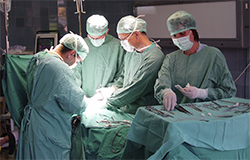 Controversial restrictions on hospital residents’ duty hours imposed in 2011 did not improve surgery patients’ outcomes, reports a large Northwestern Medicine study of U.S. hospitals, one of the first national evaluations of the results of the restrictions, published in December. The restrictions also did not result in any differences in surgical residents’ performance on exams. “Our study suggests that these latest duty hour restrictions have no benefit and may actually have the unintended consequences of hurting patient safety, resident education and the doctor-patient relationship,” said lead study author Karl Bilimoria, MD, ’10 GME, assistant professor in Surgery-Surgical Oncology and director of the Surgical Outcomes and Quality Improvement Center.
Controversial restrictions on hospital residents’ duty hours imposed in 2011 did not improve surgery patients’ outcomes, reports a large Northwestern Medicine study of U.S. hospitals, one of the first national evaluations of the results of the restrictions, published in December. The restrictions also did not result in any differences in surgical residents’ performance on exams. “Our study suggests that these latest duty hour restrictions have no benefit and may actually have the unintended consequences of hurting patient safety, resident education and the doctor-patient relationship,” said lead study author Karl Bilimoria, MD, ’10 GME, assistant professor in Surgery-Surgical Oncology and director of the Surgical Outcomes and Quality Improvement Center.
A Short Daily Walk Prevents Mobility Loss
 A 20-minute walk around the neighborhood each day could help older adults maintain their ability to walk, according to a national study that included a Northwestern Medicine research site, published in May. Moderate physical activity helped aging adults maintain their ability to walk at a rate 18 percent higher than older adults who did not exercise. Called the Lifestyle Interventions and Independence for Elders study (LIFE), the study took place across eight field centers. “The study demonstrates that a moderate intensity exercise program prevents mobility loss in older, sedentary men and women,” said Mary McDermott, MD, principal investigator of the Northwestern Medicine study site and the Jeremiah Stamler Professor of Medicine.
A 20-minute walk around the neighborhood each day could help older adults maintain their ability to walk, according to a national study that included a Northwestern Medicine research site, published in May. Moderate physical activity helped aging adults maintain their ability to walk at a rate 18 percent higher than older adults who did not exercise. Called the Lifestyle Interventions and Independence for Elders study (LIFE), the study took place across eight field centers. “The study demonstrates that a moderate intensity exercise program prevents mobility loss in older, sedentary men and women,” said Mary McDermott, MD, principal investigator of the Northwestern Medicine study site and the Jeremiah Stamler Professor of Medicine.
Scientists Publish Finding on Cause, Progression of Endometriosis
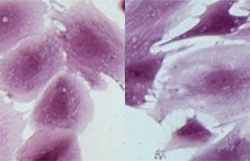 Changes to two previously unstudied genes are the centerpiece of a new theory regarding the cause and development of endometriosis, a chronic and painful disease affecting 1 in 10 women. The discovery by Northwestern Medicine scientists suggests epigenetic modification, a process that enhances or disrupts how DNA is read, is an integral component of the disease and its progression. Matthew Dyson, PhD, research assistant professor of Obstetrics and Gynecology-Reproductive Biology Research and Serdar Bulun, MD, chair of Obstetrics and Gynecology also identified a novel role for a family of key gene regulators in the uterus. “Until now, the scientific community was looking for a genetic mutation to explain endometriosis,” said Dr. Bulun, a member of the Center for Genetic Medicine and the Robert H. Lurie Comprehensive Cancer Center. “This is the first conclusive demonstration that the disease develops as a result of alterations in the epigenetic landscape and not from classical genetic mutations.”
Changes to two previously unstudied genes are the centerpiece of a new theory regarding the cause and development of endometriosis, a chronic and painful disease affecting 1 in 10 women. The discovery by Northwestern Medicine scientists suggests epigenetic modification, a process that enhances or disrupts how DNA is read, is an integral component of the disease and its progression. Matthew Dyson, PhD, research assistant professor of Obstetrics and Gynecology-Reproductive Biology Research and Serdar Bulun, MD, chair of Obstetrics and Gynecology also identified a novel role for a family of key gene regulators in the uterus. “Until now, the scientific community was looking for a genetic mutation to explain endometriosis,” said Dr. Bulun, a member of the Center for Genetic Medicine and the Robert H. Lurie Comprehensive Cancer Center. “This is the first conclusive demonstration that the disease develops as a result of alterations in the epigenetic landscape and not from classical genetic mutations.”
Mechanisms of Rare Disorder May Shed Light on Parkinson’s Disease
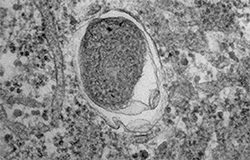 By studying a genetic mutation in patients with a rare Parkinson’s-like disorder, Northwestern Medicine scientists worked to understand the mechanisms behind the more common form of the disease. In a study published in November, Dimitri Krainc, MD, PhD, Aaron Montgomery Ward Professor and chair of the Ken and Ruth Davee Department of Neurology, and Taiji Tsunemi, MD, PhD, research assistant professor in Neurology, studied a mutation in the PARK9 gene, which is found in patients with Kufor-Rakeb syndrome. The disorder is characterized by juvenile-onset symptoms similar to Parkinson’s disease, including movement abnormalities and dementia. “We found that lysosomes do not work properly in patients with PARK9 mutation, suggesting that PARK9 plays a role on normal function of lysosomes,” Dr. Krainc said.
By studying a genetic mutation in patients with a rare Parkinson’s-like disorder, Northwestern Medicine scientists worked to understand the mechanisms behind the more common form of the disease. In a study published in November, Dimitri Krainc, MD, PhD, Aaron Montgomery Ward Professor and chair of the Ken and Ruth Davee Department of Neurology, and Taiji Tsunemi, MD, PhD, research assistant professor in Neurology, studied a mutation in the PARK9 gene, which is found in patients with Kufor-Rakeb syndrome. The disorder is characterized by juvenile-onset symptoms similar to Parkinson’s disease, including movement abnormalities and dementia. “We found that lysosomes do not work properly in patients with PARK9 mutation, suggesting that PARK9 plays a role on normal function of lysosomes,” Dr. Krainc said.
Scientists Focus on Synaptic Development in Fragile X Syndrome
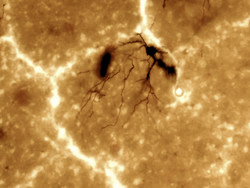 Northwestern Medicine scientists have identified events that may contribute to delayed synaptic and neuronal development in fragile X syndrome, the most common known cause of autism. Anis Contractor, PhD, associate professor in Physiology and Neurobiology, and a team of lab members led by postdoctoral fellow Qionger He, PhD, discovered that the normal maturation of the neurotransmitter GABA is delayed in fragile X mice. This delay may prevent the proper development of cells within the brain’s cortex. “There is a well-defined delay in the development of synaptic connections in fragile X, but the underlying mechanisms have remained a mystery,” said Contractor, associate director of the Northwestern University Interdepartmental Neuroscience Graduate Program. “We believe that how GABA signaling matures during early development is crucial for the proper formation of synaptic contacts, and that a delay in this switch could affect the normal wiring in the cortex.”
Northwestern Medicine scientists have identified events that may contribute to delayed synaptic and neuronal development in fragile X syndrome, the most common known cause of autism. Anis Contractor, PhD, associate professor in Physiology and Neurobiology, and a team of lab members led by postdoctoral fellow Qionger He, PhD, discovered that the normal maturation of the neurotransmitter GABA is delayed in fragile X mice. This delay may prevent the proper development of cells within the brain’s cortex. “There is a well-defined delay in the development of synaptic connections in fragile X, but the underlying mechanisms have remained a mystery,” said Contractor, associate director of the Northwestern University Interdepartmental Neuroscience Graduate Program. “We believe that how GABA signaling matures during early development is crucial for the proper formation of synaptic contacts, and that a delay in this switch could affect the normal wiring in the cortex.”
Rankings and Honors
Feinberg Retains Elite Medical School Status
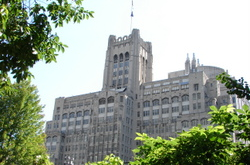 Feinberg maintained its position among the best research-oriented medical schools in the country, standing alone at 18th in the annual U.S. News & World Report rankings, announced in March. The school’s overall score rose to an all-time high for the fourth year in a row. Among specialty rankings, women’s health and pediatrics both improved one spot to No. 10 and 13, respectively. “Our reputation as a place of outstanding academic research and our placement among the top medical institutions in the country is well-deserved,” said Eric G. Neilson, MD, vice president for medical affairs and Lewis Landsberg Dean. “Even in today’s difficult funding environment, our research enterprise is growing on a scale that will serve to elevate Feinberg’s standing in the future.”
Feinberg maintained its position among the best research-oriented medical schools in the country, standing alone at 18th in the annual U.S. News & World Report rankings, announced in March. The school’s overall score rose to an all-time high for the fourth year in a row. Among specialty rankings, women’s health and pediatrics both improved one spot to No. 10 and 13, respectively. “Our reputation as a place of outstanding academic research and our placement among the top medical institutions in the country is well-deserved,” said Eric G. Neilson, MD, vice president for medical affairs and Lewis Landsberg Dean. “Even in today’s difficult funding environment, our research enterprise is growing on a scale that will serve to elevate Feinberg’s standing in the future.”
Northwestern Ranks 14th Worldwide for Highly Cited Researchers
 Northwestern University ranked 14th for most highly cited researchers worldwide in a list compiled using data from Thomson Reuters, published in July. The researchers earned placement on the list by writing the greatest numbers of articles and reviews officially designated as highly cited papers – those ranking among the top 1 percent most cited for their subject field and year of publication. “This is quite a remarkable accomplishment,” said Kristi Holmes, PhD, director of the Galter Health Sciences Library. “The placement of Northwestern among such esteemed institutions clearly demonstrates that our faculty not only have high levels of productivity, but that their discoveries are significant and push science forward on the global level, as evidenced by these high citation counts.”
Northwestern University ranked 14th for most highly cited researchers worldwide in a list compiled using data from Thomson Reuters, published in July. The researchers earned placement on the list by writing the greatest numbers of articles and reviews officially designated as highly cited papers – those ranking among the top 1 percent most cited for their subject field and year of publication. “This is quite a remarkable accomplishment,” said Kristi Holmes, PhD, director of the Galter Health Sciences Library. “The placement of Northwestern among such esteemed institutions clearly demonstrates that our faculty not only have high levels of productivity, but that their discoveries are significant and push science forward on the global level, as evidenced by these high citation counts.”
 Residency Program at Northwestern Regarded as One of Nation’s Best
Residency Program at Northwestern Regarded as One of Nation’s Best
The internal medicine residency program at McGaw Medical Center of Northwestern University was listed as one of the most well-regarded postgraduate training experiences in the country in February. McGaw was one of 10 programs to receive more than 200 nominations. Conducted by U.S. News and World Report, the published results offer new insight into the perceptions associated with graduate medical education. “We take great pride in our residency programs and it’s always wonderful when one of them receives the special recognition it deserves,” said Eric G. Neilson, MD, vice president for Medical Affairs and Lewis Landsberg Dean.
Kibbe Named Editor in Chief of JAMA Surgery
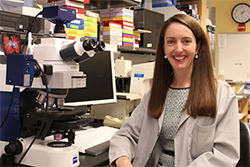 In August, Melina R. Kibbe, MD, ’03 GME, was named editor in chief of the scientific journal JAMA Surgery, effective January 1, 2015. Dr. Kibbe is the Edward G. Elcock Professor of Surgical Research in Surgery-Vascular Surgery at Northwestern University Feinberg School of Medicine. “This is an incredible honor for me,” said Dr. Kibbe. “I plan to continue publishing highly relevant and impactful work that will contribute to and advance the care of patients with surgical disease. I hope to provide a vehicle through which surgeons can remain up-to-date on current standard of care. However, I also hope to provide surgeons with novel data and innovative concepts and approaches that challenge current paradigms, forcing us to think more broadly about how we treat patients with surgical disease and to develop better and safer ways to care for our patients.”
In August, Melina R. Kibbe, MD, ’03 GME, was named editor in chief of the scientific journal JAMA Surgery, effective January 1, 2015. Dr. Kibbe is the Edward G. Elcock Professor of Surgical Research in Surgery-Vascular Surgery at Northwestern University Feinberg School of Medicine. “This is an incredible honor for me,” said Dr. Kibbe. “I plan to continue publishing highly relevant and impactful work that will contribute to and advance the care of patients with surgical disease. I hope to provide a vehicle through which surgeons can remain up-to-date on current standard of care. However, I also hope to provide surgeons with novel data and innovative concepts and approaches that challenge current paradigms, forcing us to think more broadly about how we treat patients with surgical disease and to develop better and safer ways to care for our patients.”
Feinberg Professor Mark Hersam Named MacArthur Fellow
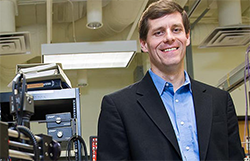 In September, Mark C. Hersam, a Northwestern University materials engineer who teaches the innovators of tomorrow and works across scientific boundaries to create new materials for use in electronics, solar cells and batteries, was named a 2014 MacArthur Fellow, an honor bestowed with a $625,000 “no conditions” award. A versatile and highly productive experimentalist, professor in Medicine-Pulmonary, the McCormick School of Engineering and the Weinberg College of Arts and Sciences, Hersam is developing novel nanomaterials for use in information technology, biotechnology, energy, such as solar cells and batteries, and flexible electronics for personalized health monitoring – the kind that can be integrated into clothing, not just strapped on your wrist.
In September, Mark C. Hersam, a Northwestern University materials engineer who teaches the innovators of tomorrow and works across scientific boundaries to create new materials for use in electronics, solar cells and batteries, was named a 2014 MacArthur Fellow, an honor bestowed with a $625,000 “no conditions” award. A versatile and highly productive experimentalist, professor in Medicine-Pulmonary, the McCormick School of Engineering and the Weinberg College of Arts and Sciences, Hersam is developing novel nanomaterials for use in information technology, biotechnology, energy, such as solar cells and batteries, and flexible electronics for personalized health monitoring – the kind that can be integrated into clothing, not just strapped on your wrist.
Departments Rank High in List of NIH Funding
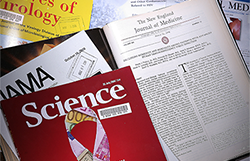 Eight departments at Northwestern University Feinberg School of Medicine ranked in the top 10 in their discipline in a list of National Institutes of Health (NIH) funding to medical schools, with an additional three departments in the top 20, according to a November report. The rankings, calculated by the Blue Ridge Institute for Medical Research, include grants awarded between October 1, 2013 and September 30, 2014. These rankings typically do not include contracts or other specialized mechanisms. “Our faculty represent top scientists, physician-scientists and innovators in their fields who rely on NIH support,” said Eric G. Neilson, MD, vice president for Medical Affairs and Lewis Landsberg Dean. “These rankings reflect their successful pursuit of scientific discovery, conducted as they mentor and train the next generation to likewise join biomedical research enterprise.”
Eight departments at Northwestern University Feinberg School of Medicine ranked in the top 10 in their discipline in a list of National Institutes of Health (NIH) funding to medical schools, with an additional three departments in the top 20, according to a November report. The rankings, calculated by the Blue Ridge Institute for Medical Research, include grants awarded between October 1, 2013 and September 30, 2014. These rankings typically do not include contracts or other specialized mechanisms. “Our faculty represent top scientists, physician-scientists and innovators in their fields who rely on NIH support,” said Eric G. Neilson, MD, vice president for Medical Affairs and Lewis Landsberg Dean. “These rankings reflect their successful pursuit of scientific discovery, conducted as they mentor and train the next generation to likewise join biomedical research enterprise.”
Shilatifard Appointed to Senior Editorial Board of Science
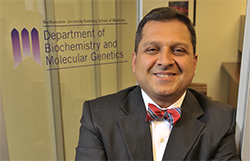 In December, Ali Shilatifard, PhD, chair of Biochemistry and Molecular Genetics, was appointed to the senior editorial board of the scientific journal Science, published by the American Association for Advancement in Science (AAAS). “I feel quite honored to be invited to join Science as a Senior Editorial Board member starting in 2015. Science is one of the oldest and most respected scientific journals published in the United States and is highly respected worldwide,” said Shilatifard, also the Robert Francis Furchgott Professor in Biochemistry and Molecular Genetics. “In my position as a Senior Editorial Board member, I will be able to provide strategic advice and constructive feedback about the entire journal. I look forward to serving AAAS and the broader scientific community in my new role.”
In December, Ali Shilatifard, PhD, chair of Biochemistry and Molecular Genetics, was appointed to the senior editorial board of the scientific journal Science, published by the American Association for Advancement in Science (AAAS). “I feel quite honored to be invited to join Science as a Senior Editorial Board member starting in 2015. Science is one of the oldest and most respected scientific journals published in the United States and is highly respected worldwide,” said Shilatifard, also the Robert Francis Furchgott Professor in Biochemistry and Molecular Genetics. “In my position as a Senior Editorial Board member, I will be able to provide strategic advice and constructive feedback about the entire journal. I look forward to serving AAAS and the broader scientific community in my new role.”
Leadership Appointments
Diane B. Wayne Named Vice Dean for Education
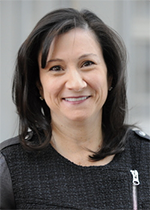 In March, Northwestern University Feinberg School of Medicine named Diane B. Wayne, MD ’91, as its new Vice Dean for Education, effective immediately. Dr. Wayne received her undergraduate and medical degrees from Northwestern as a member of the Honors Program in Medical Education. After completing her residency in internal medicine at the University of Chicago hospitals, she joined Northwestern’s medical school faculty in 1994. She was peviously the Vice-Chair of the Department of Medicine and Associate Chief Medical Officer for Medicine, Women’s Health and Psychiatry at Northwestern Memorial Hospital. “Spanning what everyone has to regard as a superb career path here at Feinberg, Diane has been instrumental in helping us formulate and lead a variety of education programs in the medical school,” said Eric G. Neilson, MD, vice president for Medical Affairs and Lewis Landsberg Dean. “Her broad knowledge of the student-resident interaction and its effect on the patient experience, as well as her great interest in how our new curriculum will mature with its modern message, will undoubtedly serve us well as we refine our commitment to comprehensive education at Feinberg.”
In March, Northwestern University Feinberg School of Medicine named Diane B. Wayne, MD ’91, as its new Vice Dean for Education, effective immediately. Dr. Wayne received her undergraduate and medical degrees from Northwestern as a member of the Honors Program in Medical Education. After completing her residency in internal medicine at the University of Chicago hospitals, she joined Northwestern’s medical school faculty in 1994. She was peviously the Vice-Chair of the Department of Medicine and Associate Chief Medical Officer for Medicine, Women’s Health and Psychiatry at Northwestern Memorial Hospital. “Spanning what everyone has to regard as a superb career path here at Feinberg, Diane has been instrumental in helping us formulate and lead a variety of education programs in the medical school,” said Eric G. Neilson, MD, vice president for Medical Affairs and Lewis Landsberg Dean. “Her broad knowledge of the student-resident interaction and its effect on the patient experience, as well as her great interest in how our new curriculum will mature with its modern message, will undoubtedly serve us well as we refine our commitment to comprehensive education at Feinberg.”
McNally to Lead Center for Genetic Medicine
 In July, Northwestern University Feinberg School of Medicine appointed Elizabeth McNally, MD, PhD, as the Elizabeth J. Ward Chair and director of the Center for Genetic Medicine. Dr. McNally joined Feinberg from the University of Chicago, where she served as the founding director of the Institute for Cardiovascular Research, director of the Cardiovascular Genetics Clinic and Carlson Professor of Medicine and Human Genetics. “Elizabeth is a superb leader who brings to Northwestern Medicine an enormous breadth of experience in human and experimental genetics,” said Eric G. Neilson, MD, vice president for Medical Affairs and Lewis Landsberg Dean. “With her vast expertise, she will reconnect the Center for Genetic Medicine to many of the major clinical disciplines of medicine, including cardiology, cancer and neuroscience to advance new genetic knowledge and enhance the growing field of personalized medicine.”
In July, Northwestern University Feinberg School of Medicine appointed Elizabeth McNally, MD, PhD, as the Elizabeth J. Ward Chair and director of the Center for Genetic Medicine. Dr. McNally joined Feinberg from the University of Chicago, where she served as the founding director of the Institute for Cardiovascular Research, director of the Cardiovascular Genetics Clinic and Carlson Professor of Medicine and Human Genetics. “Elizabeth is a superb leader who brings to Northwestern Medicine an enormous breadth of experience in human and experimental genetics,” said Eric G. Neilson, MD, vice president for Medical Affairs and Lewis Landsberg Dean. “With her vast expertise, she will reconnect the Center for Genetic Medicine to many of the major clinical disciplines of medicine, including cardiology, cancer and neuroscience to advance new genetic knowledge and enhance the growing field of personalized medicine.”
New Chair of Biochemistry Named
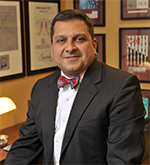 In August, Ali Shilatifard, PhD, known for his fundamental work in molecular epigenetics, was named the Robert Francis Furchgott Professor of Biochemistry and the Chairman of the Department of Biochemistry and Molecular Genetics. Shilatifard joined Northwestern University Feinberg School of Medicine from the Stowers Institute for Medical Research, where he worked as an internationally acclaimed investigator beginning in 2007. There, he published numerous studies regarding the basic mechanisms of chromatin biology in health and disease, particularly in childhood leukemia. “Ali is an internationally recognized leader in chromatin biology, gene expression and epigenetics, and on how the misregulation of these pathways contributes to human cancer,” said Eric G. Neilson, MD, vice president for Medical Affairs and Lewis Landsberg Dean. “We are privileged and excited to have him spearhead our new Department of Biochemistry and Molecular Genetics at Feinberg.”
In August, Ali Shilatifard, PhD, known for his fundamental work in molecular epigenetics, was named the Robert Francis Furchgott Professor of Biochemistry and the Chairman of the Department of Biochemistry and Molecular Genetics. Shilatifard joined Northwestern University Feinberg School of Medicine from the Stowers Institute for Medical Research, where he worked as an internationally acclaimed investigator beginning in 2007. There, he published numerous studies regarding the basic mechanisms of chromatin biology in health and disease, particularly in childhood leukemia. “Ali is an internationally recognized leader in chromatin biology, gene expression and epigenetics, and on how the misregulation of these pathways contributes to human cancer,” said Eric G. Neilson, MD, vice president for Medical Affairs and Lewis Landsberg Dean. “We are privileged and excited to have him spearhead our new Department of Biochemistry and Molecular Genetics at Feinberg.”
Platanias Appointed Director of Lurie Cancer Center
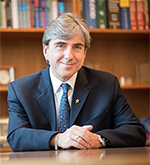 In October, Leonidas Platanias, MD, PhD, was appointed director of the Robert H. Lurie Comprehensive Cancer Center of Northwestern University, a position he served in interim since January. Dr. Platanias joined Northwestern University Feinberg School of Medicine in 2002, as the Lurie Cancer Center’s first Deputy Director and the Jesse, Sara, Andrew, Abigail, Benjamin and Elizabeth Lurie Professor of Oncology in Medicine-Hematology/Oncology. “Leon has already contributed greatly to the Lurie Cancer Center, through both his leadership and his scientific achievements,” said Eric G. Neilson, MD, vice president for Medical Affairs and Lewis Landsberg Dean. “As permanent director, he will continue in that vein, driving the center’s expansion and maintaining its reputation as a premiere venue for research, clinical care and collaboration.”
In October, Leonidas Platanias, MD, PhD, was appointed director of the Robert H. Lurie Comprehensive Cancer Center of Northwestern University, a position he served in interim since January. Dr. Platanias joined Northwestern University Feinberg School of Medicine in 2002, as the Lurie Cancer Center’s first Deputy Director and the Jesse, Sara, Andrew, Abigail, Benjamin and Elizabeth Lurie Professor of Oncology in Medicine-Hematology/Oncology. “Leon has already contributed greatly to the Lurie Cancer Center, through both his leadership and his scientific achievements,” said Eric G. Neilson, MD, vice president for Medical Affairs and Lewis Landsberg Dean. “As permanent director, he will continue in that vein, driving the center’s expansion and maintaining its reputation as a premiere venue for research, clinical care and collaboration.”
New Director of Galter to Strengthen Informatics Efforts at Library
Kristi Holmes, PhD, a bioinformaticist with a background in research impact and genomic medicine, join Northwestern University Feinberg School of Medicine in May as director of the Galter Health Sciences Library and associate professor of Preventive Medicine-Health and Biomedical Informatics. “Kristi possesses an extremely rare set of skills, combining library management and informatics scholarship with a clear vision of the intersection between the two,” said Donald Lloyd-Jones, MD, ScM, senior associate dean for Clinical and Translational Research, chair of Preventive Medicine, and director of the Northwestern University Clinical and Translational Sciences Institute (NUCATS).
New Northwestern Memorial Hospital President Named
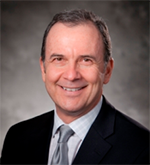 In January, Northwestern Memorial HealthCare (NMHC) announced that it had named Richard J. Gannotta, DHA, FACHE, President, Northwestern Memorial Hospital and Senior Vice President, NMHC. Gannotta was previously president of Duke Raleigh Hospital, one of three hospitals comprising the Duke University Health System. “Rick is an accomplished healthcare executive who understands academic health systems like ours,” said Dean M. Harrison, NMHC President and CEO. “He has a track record for working collaboratively and achieving results. We expect Rick to play an important role in the leadership of Northwestern Medicine.”
In January, Northwestern Memorial HealthCare (NMHC) announced that it had named Richard J. Gannotta, DHA, FACHE, President, Northwestern Memorial Hospital and Senior Vice President, NMHC. Gannotta was previously president of Duke Raleigh Hospital, one of three hospitals comprising the Duke University Health System. “Rick is an accomplished healthcare executive who understands academic health systems like ours,” said Dean M. Harrison, NMHC President and CEO. “He has a track record for working collaboratively and achieving results. We expect Rick to play an important role in the leadership of Northwestern Medicine.”
Lieber Named Senior Vice President of Research, Chief Scientist at RIC
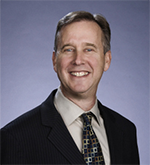 Richard Lieber, PhD, MBA, an expert in the physiology and biomechanics of skeletal muscle, was named senior vice president of research and chief scientist at the Rehabilitation Institute of Chicago (RIC) in March. “It is a pleasure to welcome Dr. Lieber to the medical school,” said Eric G. Neilson, MD, vice president for Medical Affairs and Lewis Landsberg Dean. “Rick’s long history of support from the National Institutes of Health, high-profile publications and international awards and honors speak for themselves, and his extensive volume of translational investigations will bolster our own tradition of cutting-edge research.”
Richard Lieber, PhD, MBA, an expert in the physiology and biomechanics of skeletal muscle, was named senior vice president of research and chief scientist at the Rehabilitation Institute of Chicago (RIC) in March. “It is a pleasure to welcome Dr. Lieber to the medical school,” said Eric G. Neilson, MD, vice president for Medical Affairs and Lewis Landsberg Dean. “Rick’s long history of support from the National Institutes of Health, high-profile publications and international awards and honors speak for themselves, and his extensive volume of translational investigations will bolster our own tradition of cutting-edge research.”
Notable Announcements
Les Turner ALS Foundation Commits $10 Million for New Center
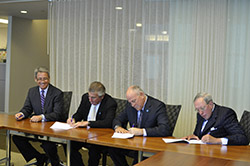 In September, the Les Turner ALS Foundation made a $10 million commitment to create the Les Turner ALS Research and Patient Center at Northwestern Medicine to accelerate research and advance patient care in amyotrophic lateral sclerosis (ALS), also known as Lou Gehrig’s Disease. ALS is a fatal neurodegenerative disease that often strikes people in the prime of their lives. The Center will bring together the Les Turner ALS Research Laboratories, the Les Turner/Lois Insolia ALS Center, the ALS tissue bank and other ALS research, clinical and education activities at Northwestern under one umbrella. “Northwestern scientists have made important advances in ALS research, and the foundation’s generosity in the creation of the new Les Turner ALS Research and Patient Center will help generate even more significant discoveries related to this yet incurable disease,” said Northwestern University President Morton Schapiro.
In September, the Les Turner ALS Foundation made a $10 million commitment to create the Les Turner ALS Research and Patient Center at Northwestern Medicine to accelerate research and advance patient care in amyotrophic lateral sclerosis (ALS), also known as Lou Gehrig’s Disease. ALS is a fatal neurodegenerative disease that often strikes people in the prime of their lives. The Center will bring together the Les Turner ALS Research Laboratories, the Les Turner/Lois Insolia ALS Center, the ALS tissue bank and other ALS research, clinical and education activities at Northwestern under one umbrella. “Northwestern scientists have made important advances in ALS research, and the foundation’s generosity in the creation of the new Les Turner ALS Research and Patient Center will help generate even more significant discoveries related to this yet incurable disease,” said Northwestern University President Morton Schapiro.
Northwestern Memorial HealthCare and Cadence Health Reach Definitive Agreement to Combine Health Systems

In May, the governing boards for Cadence Health and Northwestern Memorial HealthCare (NMHC) approved the definitive agreement to combine the two health systems. Subject to regulatory approvals, the combination would form an integrated academic healthcare delivery system spanning more than 60 sites of care across Chicago and its suburbs, including four hospitals, and more than 4,000 physicians and 17,600 employees. “Cadence Health is a strong health system with similar Patients First values to Northwestern Medicine, which is why it didn’t take long for us to identify the multitude of complementary attributes between our respective organizations,” said Dean M. Harrison, NMHC’s President and CEO.
Lurie Children’s Renames Research Institute in Honor of Transformative Gift
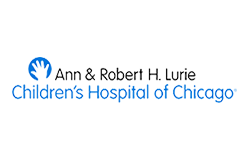 In May, Ann & Robert H. Lurie Children’s Hospital of Chicago announced a major philanthropic commitment by retired local business executive Stanley Manne. In recognition of this transformative gift, the hospital’s research center will be renamed the Stanley Manne Children’s Research Institute, affiliated with Lurie Children’s. The gift is the second-largest in the hospital’s history. The Manne donation will provide funding to sustain and enhance medical research at the 130-year-old Chicago institution, one of the nation’s premier pediatric medical centers. Upon the donor’s request, the exact amount will remain confidential. “This gift is an extraordinary philanthropic gesture that will help shape the future of pediatric medicine and research, both here in our community and throughout the world,” said Chris Reyes, Chairman of Lurie Children’s Board of Directors.
In May, Ann & Robert H. Lurie Children’s Hospital of Chicago announced a major philanthropic commitment by retired local business executive Stanley Manne. In recognition of this transformative gift, the hospital’s research center will be renamed the Stanley Manne Children’s Research Institute, affiliated with Lurie Children’s. The gift is the second-largest in the hospital’s history. The Manne donation will provide funding to sustain and enhance medical research at the 130-year-old Chicago institution, one of the nation’s premier pediatric medical centers. Upon the donor’s request, the exact amount will remain confidential. “This gift is an extraordinary philanthropic gesture that will help shape the future of pediatric medicine and research, both here in our community and throughout the world,” said Chris Reyes, Chairman of Lurie Children’s Board of Directors.
Gala Celebrates Launch of We Will. The Campaign for Northwestern Medicine

In June, nearly 950 faculty, staff, students, alumni and friends gathered to celebrate the launch of We Will. The Campaign for Northwestern Medicine on May 28 at Navy Pier. Northwestern University Feinberg School of Medicine and Northwestern Memorial Foundation are working together to raise $1.75 billion to provide crucial resources that will increase innovation and excellence across the academic medical center. “Through our shared strategic plan, we are advancing medical science and discovery while training the next generation of physicians,” said Dean M. Harrison, president and CEO of Northwestern Memorial HealthCare. “Working together provides the potential for us to exceed every patient’s expectation. Together, we are realizing our shared vision to make Northwestern Medicine one of the country’s premier destinations for patient care.”
Scientists Working to Link Medical Records throughout Chicago
 A novel computer application developed by Northwestern Medicine scientists could change the way cities track disease and epidemiologists approach research in the future. Led by Abel Kho, MD, MS, assistant professor of Medicine-General Internal Medicine and Geriatrics and Preventive Medicine-Health and Biomedical Informatics, the collaborative effort was awarded a $7 million Patient-Centered Outcomes Research Institute (PCORI) grant at the start of the year. “A great strength of the application was our ability to get both academic and nonacademic institutions onboard,” said Dr. Kho.
A novel computer application developed by Northwestern Medicine scientists could change the way cities track disease and epidemiologists approach research in the future. Led by Abel Kho, MD, MS, assistant professor of Medicine-General Internal Medicine and Geriatrics and Preventive Medicine-Health and Biomedical Informatics, the collaborative effort was awarded a $7 million Patient-Centered Outcomes Research Institute (PCORI) grant at the start of the year. “A great strength of the application was our ability to get both academic and nonacademic institutions onboard,” said Dr. Kho.
Northwestern Study to Test Parkinson’s Drug
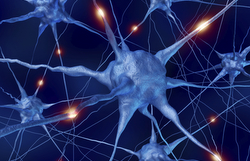 Tanya Simuni, MD, medical director of Northwestern University’s Parkinson’s Disease and Movement Disorders Center, was awarded a grant from the National Institutes of Health (NIH) to conduct a $16 million phase III study of the safety and efficacy of the drug isradipine as a potential neuroprotective agent in Parkinson’s disease. This is the only phase III Parkinson’s neuroprotective study currently funded by the National Institute of Neurological Disorders and Stroke at NIH. The research is being conducted by Northwestern University Feinberg School of Medicine in partnership with the University of Rochester Medical Center. The study will be carried out at 56 Parkinson Study Group centers in North America over five years. “If this drug proves to be safe and effective, it will change the way we treat Parkinson’s disease,” said Simuni, the principal investigator of the study.
Tanya Simuni, MD, medical director of Northwestern University’s Parkinson’s Disease and Movement Disorders Center, was awarded a grant from the National Institutes of Health (NIH) to conduct a $16 million phase III study of the safety and efficacy of the drug isradipine as a potential neuroprotective agent in Parkinson’s disease. This is the only phase III Parkinson’s neuroprotective study currently funded by the National Institute of Neurological Disorders and Stroke at NIH. The research is being conducted by Northwestern University Feinberg School of Medicine in partnership with the University of Rochester Medical Center. The study will be carried out at 56 Parkinson Study Group centers in North America over five years. “If this drug proves to be safe and effective, it will change the way we treat Parkinson’s disease,” said Simuni, the principal investigator of the study.

